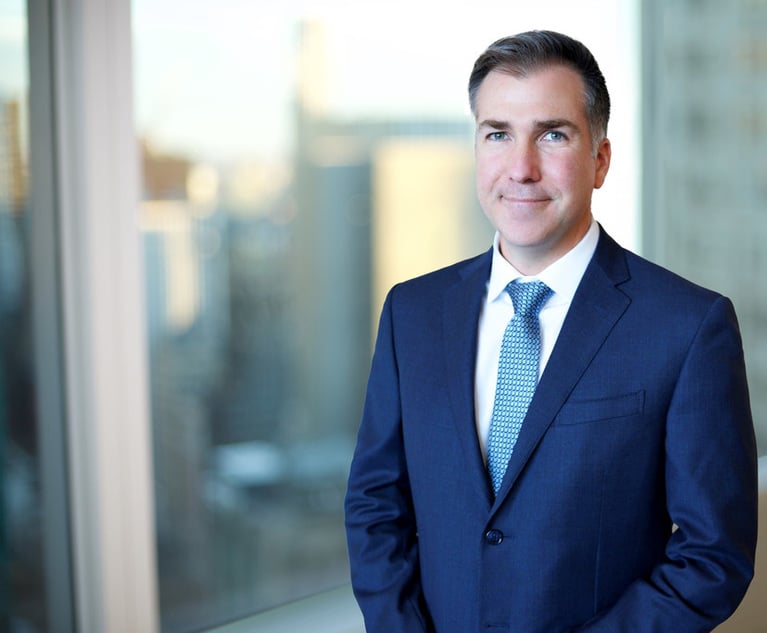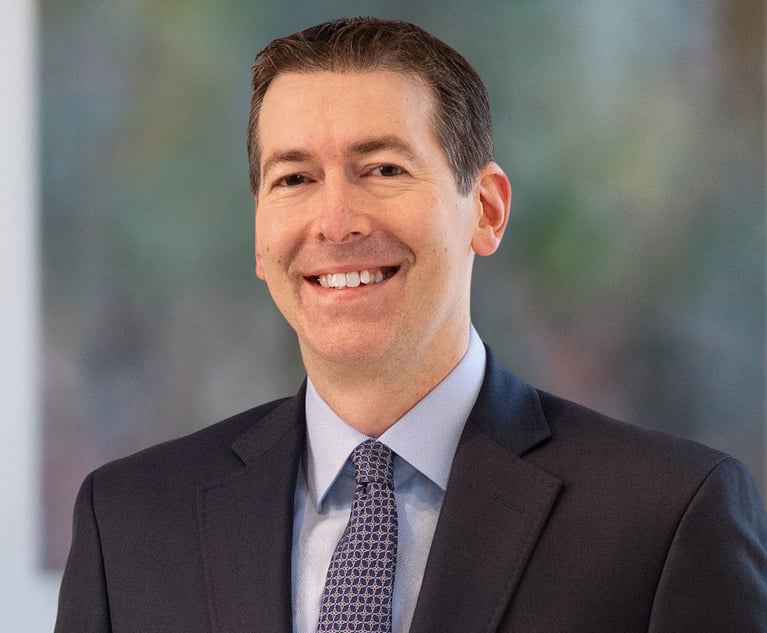Former Law Clerk Claims State Judge Sexually Harassed Her
On top of being sexually harassed by acting Supreme Court Justice Douglas Hoffman, Alexis Marquez claims her complaint led to the watering down of the court system's sexual harassment policy.
August 17, 2018 at 02:37 PM
4 minute read

A former law clerk for a Manhattan state judge claims she suffered sex- and race-based harassment at the judge's hands, but saw those claims frustrated by the “fragmented, bewildering, and Kafkaesque gauntlet” of the state court system.
Ultimately, according to her complaint filed in the U.S. District Court for the Southern District of New York, her claims not only got her fired in retaliation for raising them, but the state court's entire harassment policy surreptitiously changed to remove language that directly encompassed the types of behavior she claimed to suffer.
Alexis Marquez worked as a law clerk in the Manhattan commercial division from 2014 to 2017. She began working for acting Supreme Court Justice Douglas Hoffman in September 2017, according to her complaint. Marquez claims Hoffman began to treat her “as a wife, girlfriend, personal companion, and personal assistant” shortly after she began working for him.
Marquez claims Hoffman was relentless in his personal questions and conversations with her, suggesting they eat lunch together every day. She claims he talked about past cases involving sexual relations, invited her to imagine them married, told her to sit closer to him, and showed her personal texts and videos.
After she asked him not to contact her on her personal email, Marquez claims Hoffman became hostile, and shouted at her, called her rude and disrespectful, and told her the job would not work if she wanted a strictly professional relationship. She claims the judge threatened to fire her and demanded her silence as a condition of continued employment.
Marquez is represented by private attorney Tony Vassilev, who, according to an online bio, is married to the plaintiff. He declined to comment.
Hoffman did not respond to a request for comment.
The complaint names 16 other state court officials, including members of the Court of Appeals, Chief Judge Janet DiFiore, and Chief Administrative Judge Lawrence Marks. Marquez claims she attempted to raise Hoffman's behavior with members of the court system, but was repeatedly prevented from documenting her complaints, told they were insufficient, and was denied a response when the complaints were provided.
Marquez claims she filed an 11-page complaint in November 2017 with the court system's human resources director, Lauren DeSole, claiming harassment, discrimination, and retaliation at the hands of Hoffman. Marquez claims she was transferred and demoted immediately afterward. She claims officials then refused to respond to her repeated attempts to communication with them.
At the start of December, Marquez claims that, with no announcement either before or after, a new version of the court system's sexual harassment policy was released by the chief administrative judge. The complaint includes exhibits that she says are the previous policy and the current policy as of December 2017.
The complaint claims the changes appear to be deletions that were done directly in response to her complaints. For example, an early question-and-answer section on what to do in the event of harassment sees the recommendation on what kinds of records to keep slimmed down from 148 words to 44. All references to sexual harassment being illegal were removed, as were references to federal, state and local laws. A section encouraging employees to come forward was also removed, as was a section on seeking help from supervisors.
In an emailed statement, state court spokesman Lucian Chalfen said it remained the court system's policy not to comment on pending litigation “no matter how frivolous, poorly crafted or nonsensical.” The updating of the state court's sexual harassment policy had nothing to do with Marquez's claims, he said.
The 22-count complaint seeks, among numerous relief requests, a federal court order forcing the state court system to establish new hiring standards and practices subject to review by the federal court, as well as a new sexual harassment policy.
In a statement, Marquez's attorney Vassilev called the statement by Chalfen “emblematic of the court system's approach toward its own policies.”
”Chalfen states that it is the court system's policy not to comment on pending litigation and then proceeds to comment,” Vassilev said. “Unfortunately, the court system's 'policies' are meaningless and broken right now and hopefully this lawsuit can help address that in some way.”
This content has been archived. It is available through our partners, LexisNexis® and Bloomberg Law.
To view this content, please continue to their sites.
Not a Lexis Subscriber?
Subscribe Now
Not a Bloomberg Law Subscriber?
Subscribe Now
NOT FOR REPRINT
© 2025 ALM Global, LLC, All Rights Reserved. Request academic re-use from www.copyright.com. All other uses, submit a request to [email protected]. For more information visit Asset & Logo Licensing.
You Might Like
View All
Attorneys ‘On the Move’: O’Melveny Hires Former NBA Vice President; MoFo Adds Venture Capital Partner
5 minute read
Orrick Hires Longtime Weil Partner as New Head of Antitrust Litigation

Ephemeral Messaging Going Into 2025: The Messages May Vanish but Not the Preservation Obligations
5 minute read
Trending Stories
- 1Uber Files RICO Suit Against Plaintiff-Side Firms Alleging Fraudulent Injury Claims
- 2The Law Firm Disrupted: Scrutinizing the Elephant More Than the Mouse
- 3Inherent Diminished Value Damages Unavailable to 3rd-Party Claimants, Court Says
- 4Pa. Defense Firm Sued by Client Over Ex-Eagles Player's $43.5M Med Mal Win
- 5Losses Mount at Morris Manning, but Departing Ex-Chair Stays Bullish About His Old Firm's Future
Who Got The Work
J. Brugh Lower of Gibbons has entered an appearance for industrial equipment supplier Devco Corporation in a pending trademark infringement lawsuit. The suit, accusing the defendant of selling knock-off Graco products, was filed Dec. 18 in New Jersey District Court by Rivkin Radler on behalf of Graco Inc. and Graco Minnesota. The case, assigned to U.S. District Judge Zahid N. Quraishi, is 3:24-cv-11294, Graco Inc. et al v. Devco Corporation.
Who Got The Work
Rebecca Maller-Stein and Kent A. Yalowitz of Arnold & Porter Kaye Scholer have entered their appearances for Hanaco Venture Capital and its executives, Lior Prosor and David Frankel, in a pending securities lawsuit. The action, filed on Dec. 24 in New York Southern District Court by Zell, Aron & Co. on behalf of Goldeneye Advisors, accuses the defendants of negligently and fraudulently managing the plaintiff's $1 million investment. The case, assigned to U.S. District Judge Vernon S. Broderick, is 1:24-cv-09918, Goldeneye Advisors, LLC v. Hanaco Venture Capital, Ltd. et al.
Who Got The Work
Attorneys from A&O Shearman has stepped in as defense counsel for Toronto-Dominion Bank and other defendants in a pending securities class action. The suit, filed Dec. 11 in New York Southern District Court by Bleichmar Fonti & Auld, accuses the defendants of concealing the bank's 'pervasive' deficiencies in regards to its compliance with the Bank Secrecy Act and the quality of its anti-money laundering controls. The case, assigned to U.S. District Judge Arun Subramanian, is 1:24-cv-09445, Gonzalez v. The Toronto-Dominion Bank et al.
Who Got The Work
Crown Castle International, a Pennsylvania company providing shared communications infrastructure, has turned to Luke D. Wolf of Gordon Rees Scully Mansukhani to fend off a pending breach-of-contract lawsuit. The court action, filed Nov. 25 in Michigan Eastern District Court by Hooper Hathaway PC on behalf of The Town Residences LLC, accuses Crown Castle of failing to transfer approximately $30,000 in utility payments from T-Mobile in breach of a roof-top lease and assignment agreement. The case, assigned to U.S. District Judge Susan K. Declercq, is 2:24-cv-13131, The Town Residences LLC v. T-Mobile US, Inc. et al.
Who Got The Work
Wilfred P. Coronato and Daniel M. Schwartz of McCarter & English have stepped in as defense counsel to Electrolux Home Products Inc. in a pending product liability lawsuit. The court action, filed Nov. 26 in New York Eastern District Court by Poulos Lopiccolo PC and Nagel Rice LLP on behalf of David Stern, alleges that the defendant's refrigerators’ drawers and shelving repeatedly break and fall apart within months after purchase. The case, assigned to U.S. District Judge Joan M. Azrack, is 2:24-cv-08204, Stern v. Electrolux Home Products, Inc.
Featured Firms
Law Offices of Gary Martin Hays & Associates, P.C.
(470) 294-1674
Law Offices of Mark E. Salomone
(857) 444-6468
Smith & Hassler
(713) 739-1250






